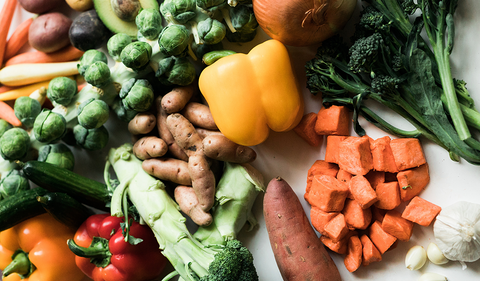Anne-Marie Stelluti is a Vancouver-based registered dietitian who specializes in digestive health nutrition. Today, she’s sharing some easy ways to improve your gut health with anti-inflammatory foods so you can lead a Glorious life. You can learn more by following Anne-Marie on Instagram at @modernguthealth.
Food plays a powerful role in reducing and promoting inflammation in the body. While short-term inflammation is the body’s natural immune response to healing and repairing itself, chronic inflammation can cause damage to our cells and tissues over time, which can reduce our quality of life and increase the risk of chronic diseases and general feeling of unwell. Chronic stress can also lead to chronic inflammation and managing this through natural nutrition and lifestyle strategies is an effective and evidence-based strategy to improve health.
Choosing to eat a variety of anti-inflammatory foods consistently is key to optimizing gut health, and luckily, there are so many anti-inflammatory foods to choose from. This includes an array of vegetables, fruits, nuts, seeds, herbs, spices, and other plant-based foods. A registered dietitian well versed in anti-inflammatory nutrition can help guide you in choosing which strategies work best for you and fit into your current lifestyle. I continue to see what a positive impact this has for my clients struggling with gut health, and it fuels my passion and purpose to continue to help people feel their best in my private practice, Modern Gut Health, with a special focus in digestive health nutrition. Here are five strategies you can implement in your diet to help keep inflammation at bay:
-
Eat more plants: Feed your good gut bacteria with fibre and aim to eat vegetables and/or fruit at each meal and snack. This could include overnight oats or a smoothie for breakfast, a veggie-packed omelette, buddha bowl, or wrap for lunch, baby carrots with hummus or energy bites for snacks, and a veggie-packed stir-fry or curry for dinner. You do not need to be vegetarian or vegan to eat more plant-based foods, but you can find inspiration by exploring vegetarian and vegan recipes in plant-based books, blogs, and podcasts.

-
Enjoy 2 tbsp of superseeds per day: Add ground flaxseeds, hemp hearts, or chia seeds into your daily routine. These are packed with healthy and essential omega-3 fats, protein, and micronutrients like calcium. Hemp hearts have the most protein, but all seeds have benefits. Simply add them on top of yogurt, granola, energy bites, smoothies, or savory dishes such as salads, soups, and dressings, or consider making a chia or flaxseed pudding.

-
Ramp up those spices: The most studied anti-inflammatory spice is turmeric, and simply adding one teaspoon of ground turmeric with a pinch or two of black pepper per day is plenty. You can add turmeric to rice, quinoa, a latte, or use it in a marinade or sauce (e.g. turmeric tahini dressing). Glory Juice Co. even has a Ginger Turmeric Health Shot to help you add this beneficial spice into your day. Explore other spices as well, such as ground cinnamon, ginger, and cardamom, which can be added to smoothies, lattes, granola, banana bread, and curries. Get inspired to try out new spice blends, such as Lebanese 7-spice or ras el hanout, which can be added to organic tofu, tempeh, legumes, chicken, or wild fish and seafood.

-
Drink 2-3 cups of strong tea/day: Green, black, and white tea have powerful anti-inflammatory effects. Allow the tea to brew for at 5-10 minutes to reap their benefits. Consider swapping your afternoon coffee or latte with a tea or tea latte.

- Unprocess your diet: Choosing foods in their whole and natural form and limiting your intake of ultra-processed foods is very helpful. Not all processed foods are bad, and some processing is used to make some very nutritious foods, including apples to make apple cider vinegar, cabbage and salt to make sauerkraut, and oats and water to make oat milk. The goal is to limit ultra-processed foods, which are packed with ingredients that you would not find in a healthy kitchen, such as artificial sweeteners, preservatives, and ingredients such as carrageenan and polysorbate 80.
Let us know your favourite ways to add these anti-inflammatory foods in your diet by tagging us on Instagram at @ModernGutHealth and @GloryJuiceCo!
Anne-Marie Stelluti is a registered dietitian and business owner of Modern Gut Health, her private practice with a special focus in digestive health nutrition, located at Inspirit Health Clinic in downtown Vancouver. She loves empowering and educating her clients to optimize their gut health and improve their quality of life using natural and evidence-based nutrition and lifestyle strategies, and she finds it incredibly fulfilling to help people overcome their struggles and come up with practical and realistic solutions that work for them. She is a graduate from McGill University and a member of the College of Dietitians of BC, and she has completed additional training with Monash University for the low FODMAP Diet for people with IBS and IBS-like symptoms, such as gas, bloating, abdominal pain, diarrhea, and constipation. She loves to do hot yoga, read biographies, and experiment with fermentation and plant-based recipes in her spare time.




Comments (0)
There are no comments for this article. Be the first one to leave a message!